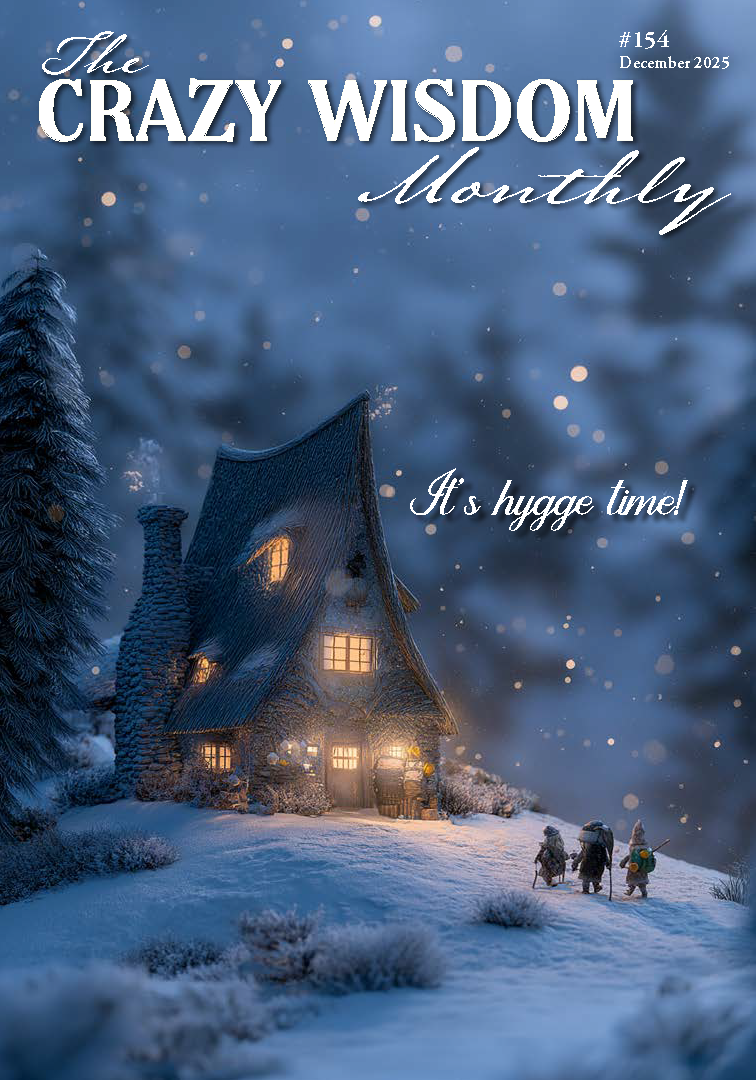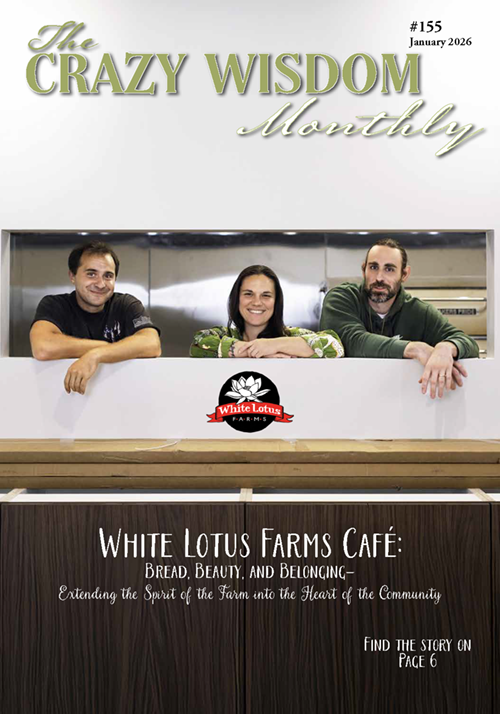The buzz had been building for months about White Lotus Farms opening a Café, and by the time you’re reading this, it is open.
Jeff Parness and the Sanctuary at Hope Farms— How to Transform Loss into Hope and Healing
Jeff Parness is full of stories; entertaining, detailed, and animated. But this story is about Parness and his newly built home in Ann Arbor. “This property saved my life. It was the clouds,” he told me. “I found this property as I was storm chasing.”
The Buzz on Protecting Pollinators Through the Winter
During the spring and summer there is always a lot of buzz around pollinators, their habitats, and how to support them. But did you know you can continue to support your backyard friends in the fall and winter as well? Through a few simple steps you can continue to provide for your local pollinators as the weather turns cold. By offering them housing during the snowy winter months you can guarantee they’ll return to your gardens the following year. It’s a win for everyone!
Nutrient Cycle at Strawbale Studio: An Evolving “Circle of Life”
There are many ways nutrient recycling is implemented at Strawbale Studio that can be used in your home garden. You might even get together with your gardening friends and start an “idea map” of the various natural resources on your site or community garden, and in your region, and how they could be returned to the circle of life!
The Michigan Medicinal Herb Supply: The Current State and a Vision for Re-localization
After a long day, you reach for your favorite herbs to make a soothing cup of tea: a spoonful of tulsi, a scoop of chamomile, and a pinch of peppermint…perfect! Just what you need to unwind. The fragrant brew might relax you, but did you ever wonder what went into bringing the herbs to your cup?
Slow Farm: Growing Healthy Food and Justice in the Food System
In late April, on a mostly sunny, cool morning, with the temperature in the low fifties, I drove out from Ann Arbor on Whitmore Lake Road to Slow Farm. I found Bayer and co-farm manager Magda Nawrocka-Weekes standing at the edge of a large field on the west side of Whitmore Lake Road, near the farm’s gate.
Cultivating Connection: The Power of Community Gardens
A community garden is like a little shared oasis, a special spot where folks from all walks of life come together to grow delicious veggies, fragrant herbs, and beautiful flowers. It becomes a green sanctuary, where members roll up their sleeves, dig in the dirt, and let nature work its magic. Often organic, community gardens help promote soil health and community connection as much as they do delicious, locally grown food.
Holler Fest: A Happy, Hoppin' Place
Ann Arbor does summer well. This town comes alive with outdoor music from June to September, but each summer the local musicians and music lovers know that to wind-up the summer, Holler Fest is the place to be.
Stories from the Farm— Sheep: Our Sweet Wooly Babies
For as long as I can remember, February has always been synonymous with sheep. This comes from my lifetime on farms and from stories passed down by ancestors that I’ve never met, yet whose tales live on through the generations of Celtic folklore. One of my favorite folktales is of Cailleach, the divine winter hag of the Isles. Cailleach created the landscape using her basket of stones and her hammer. She would clash and fight for control of the seasons with Brìghde, the goddess of summer.
Tantre Farm Honeybee Nut Festival A Fall Celebration of Nature’s Bounty
If you’re looking for a fun, free, educational, and delicious way to celebrate fall, the Third Annual Tantre Farm Honeybee Nut Festival in Ann Arbor is the place to be on Sunday Ocotber 8th.
In Pursuit of the More Perfect Apple at Amrita Farms
Amrita Farms is the only organic apple orchard within over a 50-mile radius for U-Pick apples. The farm was started 27 years ago, on a 54-acre parcel, in order to combine sustainable farming and education in pursuit of an eco-friendly lifestyle. The owner’s first initiative was to help mother nature by planting several hundred evergreens. The farm struggled since its start to find its identity, milling through multiple products with a revenue stream not taking root because of the clay soil. Kymal, known in business circles as a serial entrepreneur, refused to accept failure
Gateway Farm: Growing with Permaculture
The mid-January day I visited Gateway Farm in Plymouth was breezy, and the temperature was in the low thirties with faint flurries falling. At the farm’s small, dirt parking lot off Joy Road, I met Bridget O’Brien who, along with her husband Dr. Charlie Brennan, is the farm’s co-director. After we greeted each other, I said, “Not the best time of the year for me to see the farm, I guess.” “It’ll be okay,” she replied cheerfully. “We’ll be able to see everything because there’s no snow on the ground. Plus,” she added, “The sorrel is still green.”
Peace, Love, and Cows
There is a feeling of peace in the cowbarns at Goloka Eco Experience in Maybee, Michigan. The farm air feels crisp as it enters the lungs—unequivocally more clear than city air. In this moment, the gentle thud of a heartbeat or thwap of a tail against the ground is one’s only soundtrack against the world. Soft, big brown eyes peer out from underneath impossibly-long eyelashes, begging for pats on the head or scratches at the nape of the neck. Goloka Eco hosts an experience one simply cannot find among the hustle and bustle of regular everyday life--an invitation to be present. To come sit. To forget about time for a while. To cuddle a cow, as volunteer Karunasindhu Nitai Gaura Dasa says, is to form a “meaningful relationship.”
A Good Crop of Mental Health: A Conversation about Animal Assisted Therapy with Laura Sanders
Laura Sanders, LMSW, ACSW, has been practicing in the Ann Arbor area for 34 years and has been teaching as an adjunct professor at the University of Michigan School of Social Work for 26 years. Her approach to therapy utilizes a wide variety of evidence-based and creative therapies, including trauma recovery methods, art and play therapy, Cognitive Behavioral Therapy, and relational approaches through Animal Assisted Therapy.
Argus Farm Stop: Mission Driven
Mission driven in all its disparate pieces, this grocery store, that is so much more, is determined to serve many sectors of our local culture. It could seem confusing, if it wasn’t all so smooth. Argus is a daily farmers’ market, and a local grocery and sundries store. It is a coffee shop and cafe, a tavern, and an entertainment venue. It is an education center offering weekly webinars, classroom curriculum, and full trainings. And Argus Farm Stop is a crucial component that was missing for the growth of our local food system.
Detroit Nonprofit Paves the Way for Innovative Urban Agriculture
Tucked into a three-acre section of Brush Street in Detroit’s North End lies a utopia of freshly grown foods available to the surrounding communities at no cost. Made possible by the 501(c)(3) nonprofit organization Michigan Urban Farming Initiative (MUFI), the project, known as America’s first sustainable urban agrihood, aims to combat challenges unique to urban communities such as Detroit. More than 120,000 pounds of food are grown from seed from this portion of Detroit’s land, which was once abandoned.
Zen and the Art of Community-Supported Agriculture
Celebrating, preserving, and sharing our areas rich Agro-Centric heritage is one of my favorite interests. A somewhat new land preservation project has gained my interest over the past year and is ongoing at the corner of Scio Church and Zeeb Road. Follow me on a journey of one family’s dream passed on. This is yet another food-farm venture of Tantre` Farm’s stewards, Richard Andres and Deb Lentz.
Community Farm of Ann Arbor-- A Look at the Past, the Present, and the Future
The Community Farm of Ann Arbor was founded in 1988. It was one of the first organic, and perhaps the only biodynamic, farm in Michigan, as well as one of the first CSAs (Community Supported Agriculture). A few years after the Farm began, and up until three years ago, it was run by Annie Elder and Paul Bantle. After Annie and Paul moved to California in 2018, several other farmers ran things, and then this spring, Dan Gannon was hired to run the Farm.
The King Family: Half a Century of Farming, Making Music, Teaching Yoga, and Building Community
The King family has been a prominent presence in the Ann Arbor and Southeastern Michigan community in a myriad of ways—as farmers, musicians, teachers, and more—for nearly fifty years. The roots of the King family and their Frog Holler Farm go back to 1971, to the founding of the Indian Summer restaurant in Ann Arbor. That’s where Indian Summer’s co-founder, co-owner, and head cook, Ken King, met Cathy Munkholm. Cathy had been hired to make salads at the restaurant and worked alongside Ken, chopping vegetables.
Necessity Grows Innovative Farming In Our Own Backyard
What were once three businesses, Ann Arbor Seed Company, Green Things Farm, and the Land Loom, is now one: Green Things Farm Collective. They came together in 2020, as their website explains, “to expand production, share the management of running a diverse farm business, and develop a model of sustainable, cooperative, and responsible farming.”































































































































































































